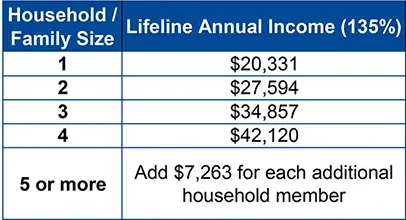So you’ve decided to get your General Educational Development (GED) certificate in Oklahoma. That’s a smart move that can greatly improve your financial and career prospects.
Reports suggest that individuals with a GED or high school diploma can earn approximately $9,000 more annually than those without.
This guide will teach you how to get a GED in Oklahoma. You’ll learn what is on the test, how to prepare (both free and paid options), and an extra benefit of doing it all with FREE cell phone and unlimited data services!
Understanding the GED
The GED comprises four subject tests: Science, Mathematics, Social Studies, and English Language Arts. Successfully passing these tests demonstrates a proficiency equivalent to a high school education. Each subject tests critical thinking and problem-solving skills, vital for both higher education and the workforce.
What is the Difference Between a GED and a High School Diploma?
A General Educational Development (GED) certificate and a high school diploma both serve as recognized proofs of secondary education, but they are obtained through different means. A high school diploma is awarded upon completing the required courses and credits in a traditional high school setting, encompassing a variety of academic and extracurricular experiences.
The GED diploma, on the other hand, is acquired by passing tests in core subjects such as Science, Mathematics, Social Studies, and English Language Arts, and is an effective alternative for those who couldn’t complete their high school education traditionally. Both credentials are valued for further education and career opportunities, offering similar benefits in professional and academic pursuits.
GED Eligibility in Oklahoma
To take the GED in Oklahoma, you must be at least 16 years old. However, candidates under 18 must meet additional criteria, such as having parental consent and not being enrolled in high school.
For detailed eligibility requirements, visit the Oklahoma State Government website.

Preparing for the GED
Preparation is key to GED success. The Oklahoma Department of Libraries offers free resources ODL, and many community colleges provide preparatory classes.
For example, Tulsa Community College TCC offers GED preparation courses. Online platforms like GED.com provide study materials, practice tests, and free online courses or have minimal costs.
In person classes are available from the state government.
In-Person Test Center vs. Online GED Pros and Cons
You can choose between in-person testing at authorized centers or online testing.
Pros and Cons of In-Person GED Testing
Pros:
- Structured Environment: In-person testing provides a structured and supervised environment, which can help minimize distractions and focus on the test.
- Immediate Support: If you encounter any issues or have questions, test center staff are available to assist immediately.
- Familiar Format: For those accustomed to traditional classroom settings, in-person testing can feel more familiar and less intimidating.
- No Technology Concerns: Avoids the need for a reliable internet connection and suitable computer setup, as required for online testing.
Cons:
- Travel and Scheduling: Requires traveling to a test center, which may be inconvenient or challenging for some candidates.
- Fixed Test Dates: In-person tests are scheduled on specific dates and times, offering less flexibility compared to online testing.
- Potential Stress: The presence of other test-takers and the formal test setting may increase anxiety or pressure for some individuals.
- Health and Safety Concerns: In situations like a pandemic, attending a physical location may pose health risks.
Pros and Cons of Online GED Testing
Pros:
- Flexibility: Online testing offers the convenience of choosing your test date and time, providing flexibility to fit your schedule.
- Comfort of Home: Taking the test from the comfort of your own home can reduce anxiety and create a more relaxed testing environment.
- No Travel Required: Eliminates the need for transportation to a test center, saving time and travel expenses.
- Safe and Private: Particularly beneficial during health crises like a pandemic, and ensures privacy during the test.
Cons:
- Technology Requirements: Requires a reliable internet connection, a suitable computer with a webcam, and a quiet, private space, that may not be accessible to all.
- Self-Discipline: Requires a higher degree of self-discipline to manage distractions and stay focused in a home environment.
- Limited Immediate Assistance: In case of technical issues or questions, immediate, in-person assistance is not available.
- Verification Process: The online test includes strict identity verification and monitoring procedures, which might be stressful or challenging for some test-takers.
What is the Cost of the Oklahoma GED Exam?
The cost for the GED test in Oklahoma is around $34 per subject, amounting to approximately $136 for all four subjects. Financial aid is available through various programs, and details can be found on the official online GED test website or local educational institutions.
Tips for Passing the GED
Regular study and a practice test are vital. The GED Testing Service website provides free practice tests and study guides. Time management skills are crucial during the test, so practice working within time limits.

After Passing the GED: What’s Next?
Passing the GED opens numerous doors. For instance, Oklahoma State University OSU and other institutions welcome GED certificate holders. This achievement also enhances job prospects, with employers recognizing the value of a GED.
Accessing Additional Support: Lifeline and ACP Programs
While pursuing your GED, consider support programs like the Federal government’s Lifeline and ACP through participating wireless providers like EASY Wireless.
What are the Lifeline and ACP Programs?
The Lifeline and Affordable Connectivity Programs (ACP) are government initiatives designed to make communication services more accessible. Lifeline provides a discount on phone or internet services to eligible low-income consumers, while ACP offers a larger benefit for mobile broadband services.
Eligibility for these programs typically includes participation in government assistance programs such as:
- Medicaid
- Supplemental Nutrition Assistance Program (SNAP)
- Supplemental Security Income (SSI)
- Federal Public Housing Assistance
- Veterans Pension and Survivors Benefit
- Various Tribal Programs
… or having an income that is at or below 135% of the Federal Poverty Guidelines.

These programs aim to ensure that all individuals have the necessary connectivity for daily life, education, and work.
Benefits of Enrolling in Lifeline and ACP with EASY Wireless
Enrolling for Lifeline and ACP with EASY Wireless gives access to a FREE Smartphone and Free monthly services including Talk, Text, and Data. This can be a game-changer for accessing online study resources and maintaining communication with tutors and peers.
Enter your email and zip code in the box below and click “Enroll Now” to get started. You’ll can qualify for free service in only minutes.
Start Saving Today!
Start Saving Today!
Take the First Step Towards Higher Education and Income
Achieving your GED in Oklahoma is more than just an educational milestone; it’s a gateway to better employment opportunities and a higher earning potential. By leveraging the resources and support available, such as EASY Wireless, you are well-equipped to succeed in this endeavor. Take the first step towards a brighter future today!


